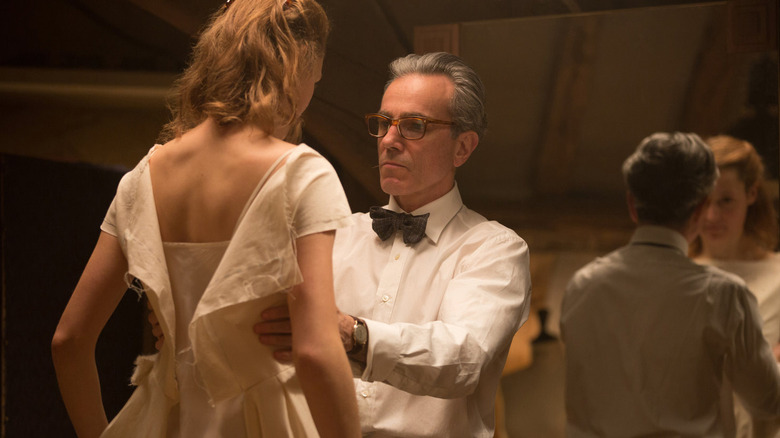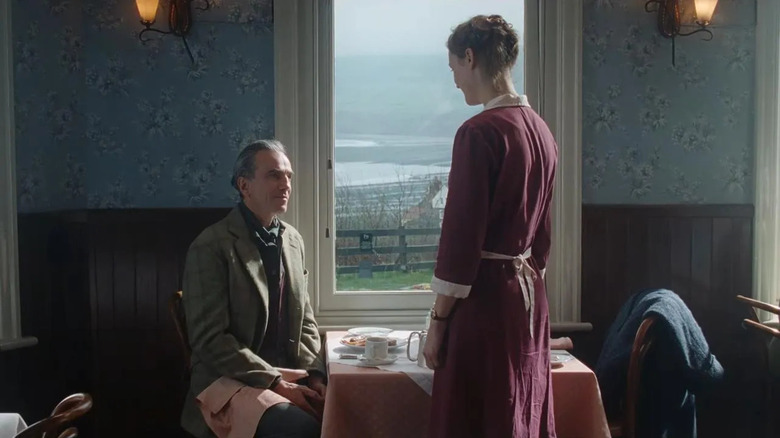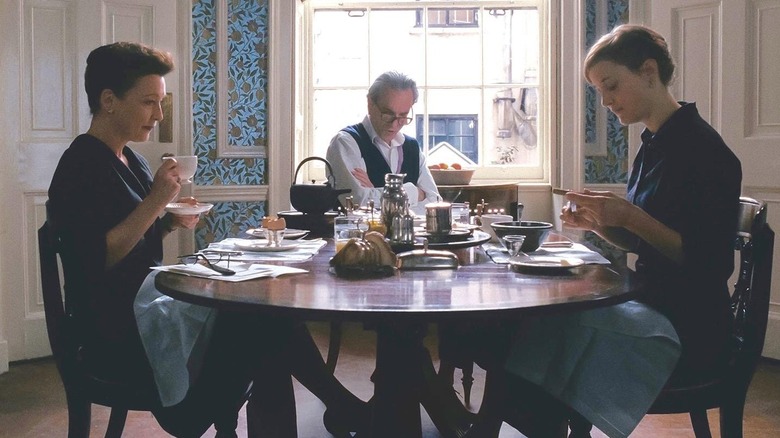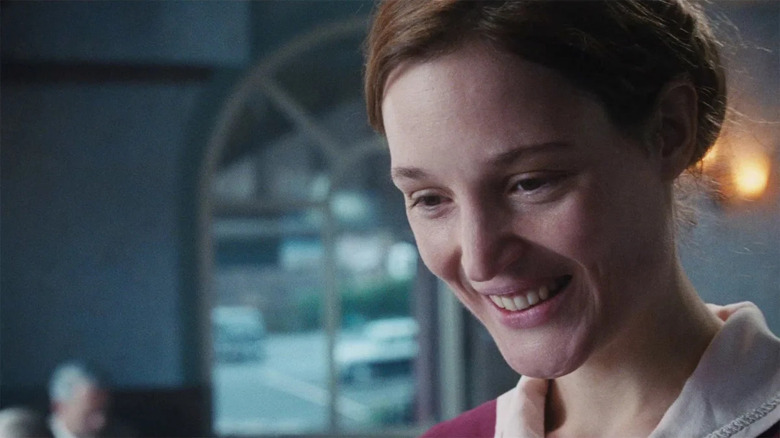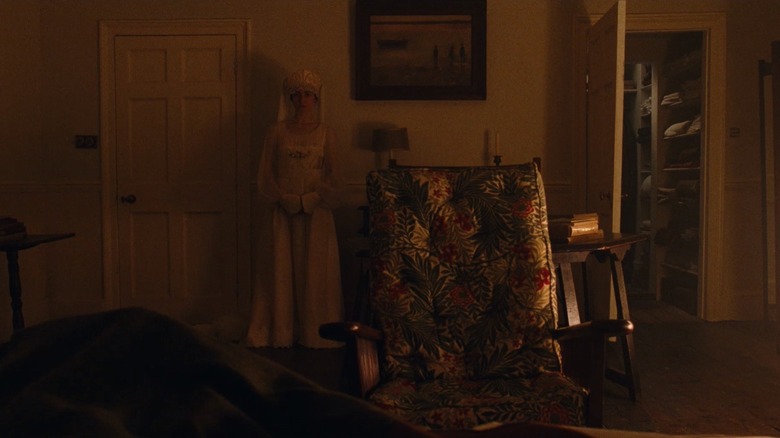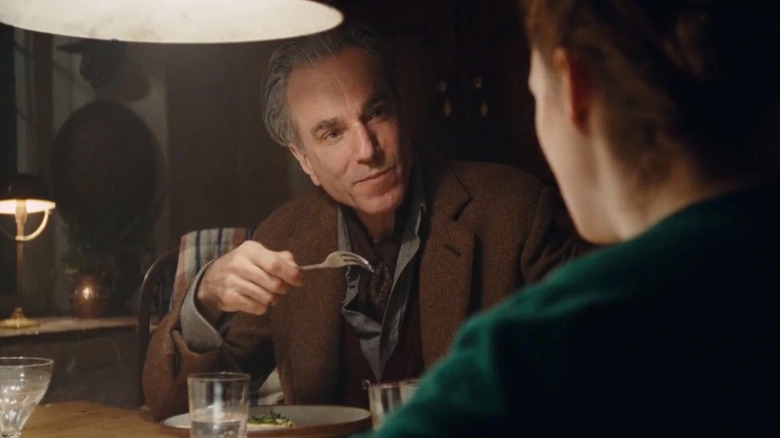Phantom Thread Ending Explained: Dressing Down The Dressmaker
When Daniel Day-Lewis announced that his final film before retirement would be Paul Thomas Anderson's "Phantom Thread," he picked the perfect place to bow out. In a career studded with powerful performances and three Oscar wins for Best Actor, he has portrayed few characters as fascinating as Reynolds Woodcock, the fussy, domineering, haute couture dressmaker in Anderson's peculiar romantic comedy of manners.
Anderson has yet to make two films alike, which makes him one of the most fascinating modern directors. While his films are often visually stylish, they are also driven by character rather than plot, populated by outsiders, eccentrics, and people led by their powerful desires. In the early part of his career, his films often resembled those of other directors, while he created his own idiosyncratic world within that familiar space. Just take "Boogie Nights," which looks and moves like "Goodfellas" but tells a far more touching story as it explores the lives and surrogate familial bonds within a group of adult film entertainers.
Likewise, "Phantom Thread" initially recalls Hitchcock films like "Rebecca" and "Vertigo," focusing on the controlling influence of a middle-aged man over a younger woman he has fallen in love with. As the story unfolds, the power dynamic isn't quite as one-sided as we might have first feared, and Anderson explores the micro-aggressions within a relationship in acute detail. We all give a little of ourselves when entering a serious relationship, but how much do you give without giving too much away? On the flip side, how much do you take from the other person, and can a couple ever find the right balance?
Since "Phantom Thread" is a Paul Thomas Anderson film, it takes a strange turn in the third act, as the psychological tug-of-war finds an unlikely truce in a potentially cruel and dangerous act.
So what happens in Phantom Thread again?
"Phantom Thread" is set in 1950s London, where Reynolds Woodcock is an esteemed fashion designer who counts celebrities and royalty among his many loyal clients. Working with his highly skilled team of seamstresses in his large townhouse, he adheres to a strict daily routine. Meanwhile, the day-to-day business is overseen by his stern sister Cyril (Lesley Manville), who also gets rid of Reynolds' latest girlfriends when he grows tired of them.
On a trip out of town, Reynolds finds himself instantly smitten with Alma (Vicky Krieps), a young waitress working at a guest house. She makes it clear that the feeling is mutual, and after he tests her attentiveness with an extravagant breakfast order, they start a relationship. She moves in with him and initially helps inspire Reynolds' work, modeling his latest gowns for his customers. She enjoys becoming part of the rarified fashion scene but stands out from his previous lovers with her frank attitude and unwillingness to back down.
The first flush of their relationship quickly fades. Reynolds finds Alma a distraction, and he becomes very distant. She tries to regain his full attention by kicking all the staff out of the house and cooking a romantic dinner, but the extra deviation from his usual routine sets Reynolds off on a callous rant. Alma retaliates by poisoning his tea with toxic mushrooms, making him fall horribly ill.
Could murder be afoot? Far from it. As it turns out, Alma's method of cutting Reynolds down to size is greatly appreciated by the man himself.
What exactly is the problem with Reynolds?
Reynolds Woodcock is clearly not an easy person to get along with. Fastidious in his work and hard to please, he is gravely courteous to his clients but dismissive or outright rude to anyone else who doesn't measure up to his high standards. He can be very charming when it suits him, but most of the time he's away in his own head, dreaming up his latest dress designs.
Reynolds lives for his work, and there is a sense that his craft and strict routines are what holds him together. Beyond designing clothes, he leaves anything more mundane to his sister and his house staff. Reynolds is still troubled by the death of his mother, and Cyril has taken her place in some respects. She takes care of his personal and business affairs and isn't afraid to tell him off when he oversteps the mark. It's tough to read Cyril, but I also get the feeling she resents her brother for how much he depends on her.
One interesting article suggests Reynolds suffers from OCD, and his routines are part of his ritualistic behavior. This would make sense, as the whole House of Woodcock has become attuned to his patterns and foibles, marshaled by Cyril. Distractions are carefully avoided to prevent triggering him, because getting stuck in a loop could potentially ruin a day's work. Breakfast is a critical time for Reynolds, but newcomer Alma blithely disrupts it. Anderson cranks up the sound of her buttering her toast to show this with comic effect.
OCD can also have an effect on physical relationships, which may explain why Alma is given her own bedroom rather than sleeping with Reynolds. It doesn't come across as though the arrangement is just to appear "proper" by the conventions of the time.
What is Alma's story?
"Phantom Thread" opens and closes with Alma talking about her relationship with Reynolds to a doctor, so it feels as though the story is told from her perspective. However, she is harder to decipher than the prickly dressmaker.
When they first meet at the guest house, we perhaps fear for her. Will this be another tale of a young woman swept off her feet by a tortured genius and then subjected to his toxic masculinity? That seems how it will play out at first, but we quickly get clues that Alma won't let Reynolds walk over her by the way she talks back and needles him.
What are her motives? Just as Reynolds seeks a woman who can fill the gap left by his beloved mother, Alma may also be seeking someone to nurture. She is initially unperturbed by his demanding nature and seems eager to please. During their first meeting, she isn't caught unawares when Reynolds keeps the slip with his lengthy order because she has already committed it to memory. Tellingly, when she returns with the food and hands him a note, she refers to him as "boy," although he is a good 20 years older than her.
While Alma is clearly strong-willed, she does make concessions to Reynolds' routine. During a later breakfast scene, she is noticeably buttering her toast without a sound. She only reveals the true size of her determination when Reynolds tries to reject her, bringing him low by poisoning, so he is completely docile and dependent on her.
It's a ballsy and dangerous power play that provides them both with exactly what they need in their relationship. Reynolds enjoys the reset that a few days of complete helplessness gives him, and Alma is in her element mothering him while he's sick.
Reynolds' mommy issues
Early on, Reynolds tells Cyril that he has been dreaming about their deceased mother recently, and he senses she is near. Does his dream somehow foretell a new mother figure about to enter his life very soon?
Reynolds is still very troubled by the death of his mother, who passed away before her time. He is comforted by the idea of her watching over him and has a lock of her hair sewn into his jacket. In his mind's eye, he always pictures her wearing the wedding dress he made for her when he was just 16. It is implied that this was his way into the dressmaking business and that she may have passed away in the garment.
Cyril has taken over some of the maternal duties for Reynolds, but there is nothing to suggest their relationship is particularly affectionate. Perhaps this is what he seeks in other women: someone to mop his brow when the pressures of his controlling nature become too much.
Alma seems perfect at first, but Reynolds rejects her when she oversteps the mark. That's when she first poisons him, seeking to break him down so badly that he has no choice but to accept her. While he is sick in bed, he hallucinates seeing his mother in the room with him, standing silently in her wedding dress. He talks to her, but she is unable to respond.
Alma enters, drawing his eyes away from the apparition. He watches her busying around the room, and his mother vanishes. It's a strongly symbolic moment as his attention is transferred from his mother to Alma when he's at his weakest. Alma's plan works; when Reynolds recovers, he acknowledges the need to change and asks her to marry him.
The significance of the final meal
The marital bliss is short-lived and Reynolds complains bitterly to Cyril about Alma, who overhears. It's time to bring Reynolds into line again, and the next time they're out at the cottage, she cooks him an omelet with the same poisonous mushrooms she used on him before.
Throughout the scene, we get callbacks to things that normally irritate Reynolds as Alma asserts her authority over him, and he takes comfort in letting her. Earlier, we found out he only likes his mushrooms cooked with a little butter; she ladles the stuff on. During breakfast, we saw him getting annoyed with her for pouring tea too loudly; now she pours him a glass of water by trickling the water into the glass from a great height.
Reynolds realizes the omelet is poisoned, but he eats it anyway as Alma says she wants him weak and helpless with only her to look after him, then make him strong again. Once again, she adopts the tone of a parent, saying he needs to "settle down a little." Reynolds seems almost giddy at the prospect and kisses her, the first proper moment of romantic passion we've seen from him.
There is clearly a sadomasochistic element to this exchange of the dominant role, but one that is crucial to the survival of their relationship. Reynolds understands that the poisoning helps purge his toxic behavior and become a loving husband, and Alma has no qualms about spiking him to achieve that reset in his personality.
It's a dangerous game that ultimately might kill Reynolds, but while it lasts, it gives them a happy ending. Alma dreams of their future, and we are left with an image of them contently working on a dress together and facing each other as equals.
